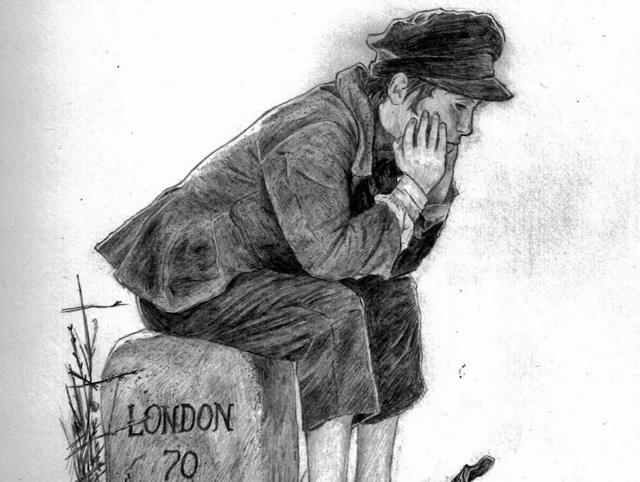
When we think of the work of the great writer Charles Dickens, what usually strikes our memories are the colorful cast of characters that inhabit his stories. Of these, there are a couple that instantly spring out as the defining Dickensian characters. Ebeneezer Scrooge of course would be one, but the other character that also stands out as the one that instantly comes to mind when discussing Dickens is Oliver Twist. The little orphan boy who dared to ask for “more” has become an iconic character in literature, and the quintessential image of a Victorian era outcast scrapping by on his own in an oppressive, unforgiving world. Naturally, his story is one that has been given attention to by Hollywood, who have continued to mine Dickens’ tale for several generations. What’s interesting about little Oliver’s journey on the big screen is that it actually delves deeper into the character of Oliver than Charles Dickens ever did in his own book. The literary Oliver is purely just a catalyst for Charles Dickens to explore larger themes within Victorian society, including class divisions, squalid inner-city conditions, incompetency and cruelty by social services, and the cut throat nature of the criminal underworld. Oliver is a rather passive character through most of the book; a pawn in a game much larger than himself. And yet, he has proven to be a powerful symbol, representing the often forgotten outcasts of society who face persecution everyday purely because of their placement on the social strata. In cinema, Oliver fulfills that symbolic role too, but is also given the grace of a more rounded personality depending on the film. The interesting about the character and his story is that they can also be reinterpreted in many different ways, like using a different time or place, and still retain it’s primary essence. In this article, I will be looking at 7 of Oliver Twist’s most notable cinematic versions, and seeing how time has changed the character and story of this iconic character.
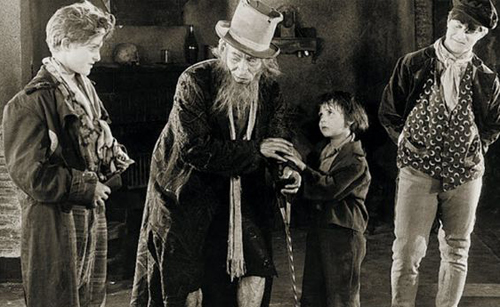
JACKIE COOGAN from OLIVER TWIST (1922)
Though not the first cinematic outing for young Oliver, this was certainly the first earnest attempt by Hollywood to adapting Dickens novel. For the role of Oliver, young Jackie Coogan, the most famous young actor of the time thanks to his star making turn in Charlie Chaplin’s The Kid (1921), was cast. Coogan’s involvement was natural given how his part in Chaplin’s classic comedy was in some ways inspired by the character of Oliver. Here, Oliver is somewhat limited in character mainly due to the constraints of the silent era, but Coogan does a descent job of filling the part. Bright eyed and broadly mannered, his Oliver is every much the precocious youth that you would imagine him to be for a silent retelling like this one. His best moments are those he shares with the raggedly dressed and decrepit ringleader of thieves, Fagin, here played by none other than the “man with a thousand faces,” Lon Chaney. The film, more or less, is purely another showcase for Cheney to disappear into another character with his groundbreaking make-up and physicality, though it is far from Cheney’s most impressive work. Still, him and Coogan have great chemistry as Fagin and Oliver, and seeing the two play off each other does represent the best subtleties of silent era performances. Coogan’s young orphan Oliver more or less falls into line with Dickens original, becoming a catalyst for the rest of the plot to revolve around, and his innocence is perfectly conveyed in the film. Being only 8 years old at the time of the film’s making, Coogan remarkably already hit a high standard for other child actors to match in the years ahead for the role of Oliver Twist.
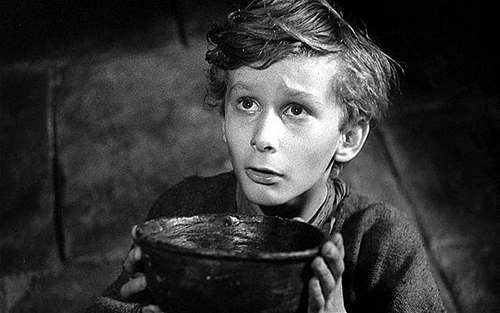
JOHN HOWARD DAVIES from OLIVER TWIST (1948)
This post-war British production is often considered by many to be the greatest cinematic version of Oliver Twist ever made, and it’s tough to argue. For one thing, it was directed by the legendary David Lean of Lawrence of Arabia (1962) fame, who in his early career was given the prime opportunity of adapting two classic Dickens novels to the big screen. One was the critically acclaimed Great Expectations (1946), and the other was this 1948 film. You can see the sense of scale and scope that Lean was clearly trying to refine on display here, because this is even today an impressively constructed film. The film also features some standout performances from the cast, all capturing the essence of Dickens’ original visions. Robert Newton brings special menace to the villainous Bill Sykes, and Alec Guinness is almost unrecognizable as Fagin; though his clearly Semitic interpretation of the character is a somewhat troubling reminder of the anti-Semitic leanings of Dickens’ original text. The role of Oliver was played by young newcomer John Howard Davies, who especially fits the portrayal of the iconic orphan. With his puppy dog eyes and sallow face, he looks every bit like what you’d expect an impoverished child in Victorian era London to look like. He certainly has the look of what Dickens wrote down on the page, and that also carries over into his characterization as well. The movie is also a very accurate retelling of the book, covering all the political and social intrigue that surrounds Oliver’s story, and again, it limits Oliver as a passive character in the process. Still, Davies tries his best, and comes away as one of the best versions of the character ever put on screen.
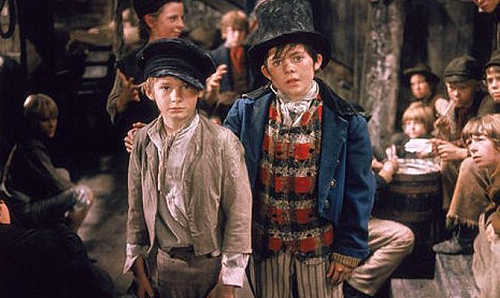
MARK LESTER from OLIVER! (1968)
Apart from the David Lean classic, this is probably the most highly regarded cinematic treatment of Dickens’ story. This big budget, widescreen musical directed by Carol Reed was one of the last of it’s kind from that era of Hollywood, and was the big winner at the Academy Awards, taking away 8 total including Best Picture. As far as musical adaptations go, it’s hit or miss. It’s production values are impressive, and some of the performances are strong, especially Ron Moody as the scene-stealing Fagin. The role of Oliver likewise is a mixed bag. Mark Lester, who plays Oliver, certainly looks the part, and at times performs very well in the film’s dialogue driven scenes. But, because this is a musical and he is the lead, Oliver has to sing and unfortunately that’s beyond young Mark’s range. Pretty much all of the verses sung by Oliver in the movie are dubbed over by another singer; and strangely not by another similar sounding boy either, but by what seems like a grown woman trying to sound boyish. It’s a distracting element in the movie and one that unfortunately casts a shadow over Mark Lester’s decent performance. Since he’s the only dubbed actor too, it also makes him feel out of place, especially compared to the vocally trained Jack Wild as the Artful Dodger, who was carried over from the original theatrical cast. It’s clear that Mark Lester’s innocent doey-eyed look is what won him the role, but it came at a cost to performance overall, because he came ill-equipped to match his co-stars vocally. Still, for an actor as young as he was at the time, it’s still was impressive of him to carry a huge production like this on his shoulders, and it’s often his visage from the “asking for more” scene that we see attached to most visual references to Dickens’ novel.
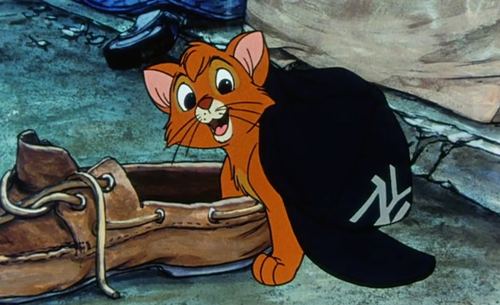
JOEY LAWRENCE from OLIVER & COMPANY (1988)
It seemed only natural that Disney themselves would approach Dickens’ classic with a musical adaptation of their own. But, in order to distance themselves from the classic 1968 musical, they approached the story in an entirely different angle. Instead of Victorian era London, they set their version in Reagan Era New York City. And instead of orphan children, this version is centered around dogs and cats. Oliver is no longer a child stuck in an oppressive orphanage, but is instead an unwanted kitten forced to survive along on the streets of the big city. Though elements of the story remain the same, it is largely an original tale more inspired by Dickens rather than to the letter faithful. One thing that it does change in an interesting way is the relationship between Oliver and Dodger. Here, Dodger is very much older than Oliver, and acts as more of a father figure than in previous versions. He assumes more of the role that Fagin had in the past, who in this film is relegated to more of a supporting role, being one of the few human characters. A very young Joey Lawrence voices Oliver here, and in many gives Oliver a sense of character little seen before. He’s a very Americanized version of the character; vulnerable, impulsive, and with a strong sense of setting out his own path. He also takes a far more active role in his story, even bearing his claws and fighting back against threats at various points in the movie. The movie doesn’t delve too deep into the more complicated and darker elements of Dickens’ novel (it is Disney after all), but some of the film’s best elements centers around Oliver finding his identity in literal “dog eat dog” world. Though far from Disney’s best, it at least does a decent job of bringing Oliver Twist into the 20th century and giving the classic character much more of an active role.
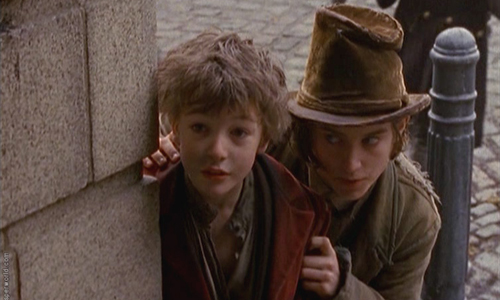
ALEX TRENCH from OLIVER TWIST (1997)
Disney would once again return to the classic story, only this time without the songs nor the modern setting; and on the small screen no less. This TV movie adaptation, made for ABC’s “Wonderful World of Disney” program, is a modestly constructed retelling of Dickens’ novel, with a TV friendly budgeted portrayal of Victorian England. It more or less plays out like a non-musical version of Oliver!, which has it’s benefits. The film doesn’t get distracted by needless plot points and instead focuses on it’s central characters. Unfortunately, this leads once again to a passive Oliver. Here, he is given too little personality to be memorable, and poor young Alex Trench seems out of his element in the role (this would also be his one and only film role to date). More focus is given to Fagin (played by an over-acting Richard Dreyfus) and to Dodger (played by a pre-Lord of the Rings Elijah Wood), which does provide an interesting character dichotomy to this story that we haven’t seen before. Here we see both characters act as the two opposing points of view guiding Oliver through his development. Dodger is the more outgoing and humane, but he attracts Oliver to a world that is far more unforgiving. Fagin is rigid and suspicious, but putting up more walls helps to shield Oliver from far worse things in the world. For a TV movie, it does give a richer portrayal to these secondary characters, but Oliver isn’t so lucky. It does bring the story back to it’s roots with a modern sensibility that sheds new light on the old story in a positive way, which is something that you rarely see in a network made-for-TV movie.
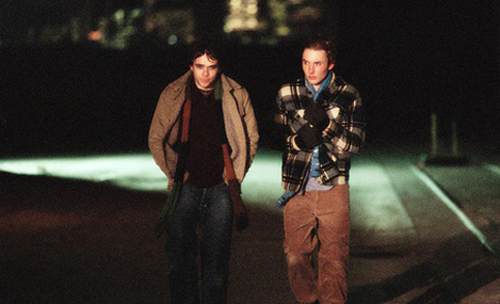
JOSHUA CLOSE from TWIST (2003)
Oliver Twist would once again see a whole other modern “twist” (pardon the pun), only this time far from the family-friendly Disney version seen in Oliver & Company. Here, we see Dickens story re-imagined with a queer sensibility, with Oliver slipping into the world of street hustling instead of pick-pocketing. This version of Oliver is considerably older, becoming a wayward youth instead of a lost orphan. The film delves deeper into the relationship between him and Dodger, played here by Nick Stahl (Sin City), which adds a romantic level to their friendship; one that ultimately turns toxic as Stahl’s Dodger sinks deeper into a drug addiction. While the new dimension added to the story brings an interesting angle to develop the characters around, the movie sadly doesn’t make it all work in the end. It’s clear that filmmakers used the blueprint of Dickens’ original story to portray their own window into the seedy underbelly of modern slums and the crime world that festers there, but it doesn’t elevate any higher than the surface level of that to become anything really profound; especially not at the level that Charles Dickens would have gone. Fresh-faced, handsome Joshua Close does a decent job portraying this grown up Oliver, and his vulnerable performance is one of the film’s highlights. It’s just too bad a look at a queer themed Oliver Twist had to loose focus and become too indulgent in it’s look at the darker parts of society. The story is after all about a young child seeking an identity in a world that is constantly acting against him. It is interesting to see Dickensian social injustice added onto a queer love story, but the film looses the nerve to make it work the way it should.
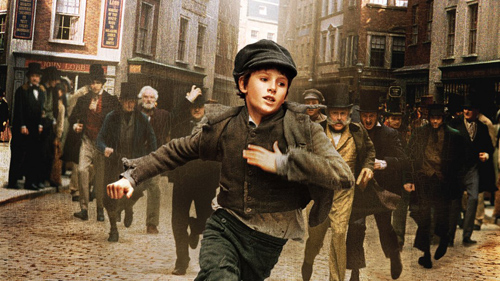
BARNEY CLARK from OLIVER TWIST (2005)
Here we have one of the more unexpected adaptation of Dickens’ novel. When you think of all the different filmmakers who would be attracted to the story of Oliver Twist, the last one who would come to mind is Roman Polanski. The Rosemary’s Baby (1968) and Chinatown (1974) director is no stranger to darker themed stories, but for him to take a straight-forward approach to Dickens’ tale was somewhat unexpected. And yet, it makes sense, because if there is a running motif in Polanski’s full body of work, it would be the loss of innocence, which Oliver Twist fits perfectly within. The movie came and went in theaters pretty quietly in 2005, and few people even know that this movie exists, which is too bad because it is probably the best cinematic version of this story since David Lean’s classic in my opinion. I will even say that this has what is probably the best cinematic portrayal of Oliver Twist as a character that we’ve ever seen. Here, Oliver is no longer a passive player in his own story, but rather a fully realized person. The movie does away with all of the political sub-plotting that surrounds the main story, and instead focuses like a laser beam on Oliver’s journey. It builds a far more personal relationship between Oliver and Fagin (played wonderfully by Ben Kingsley) for one thing, where you see the strong effect that the old man has had on Oliver’s upbringing, both positive and negative. Young Barney Clark is also quite good in the role, bringing subtlety and emotion to the character that we’ve rarely seen before. The fact that he has a lot more to do in the story helps to improve the character greatly, and it’s something that should be celebrated more within the whole history of this character. Any Dickens’ fans out there should seek this version out because it is worthy of rediscovery. And for the character of Oliver, it is a milestone, because he finally get the focus that he has long deserved.
So, there you have a look at Oliver Twist’s cinematic journey. As the years have gone on, we see far more of a focus given to the little boy and his personal journey. In a way, he has shone more clearly on the big screen than he ever did on the page. Charles Dickens didn’t exactly treat the young boy as an afterthought in his original book, but it’s clear that Oliver had little impact over his own direction in life. Cinematic versions, which have streamlined the story over time, have found ways to let Oliver stand out more and give him a personality that makes him distinctive and worth taking interest in. My feelings is that David Lean’s classic adaptation made the best attempt at capturing the essence of Dickens’ novel while Roman Polanski’s version brought out the best essence of the character. There are interesting imaginings over the years too, like the two musical version by way of Broadway and Disney, but it’s those two features from wildly different eras that offer the best portrayals of Dickens’ classic. In many ways, Oliver Twist had to mature as a story with more modern sensibilities in order to fully realize the character himself. Nowadays, we are better able to find child actors who can carry the weight of a difficult character, as well as filmmakers who can trust their young stars with deeper material. The story of Oliver Twist is a difficult one to pull off, as it centers around a child in near constant peril and hits hard at the social injustices that have put him in the state that he’s in. That’s a lot to ask a young performer to undertake on screen, but we have thankfully had a fair helping of capable young actors who have done justice to the character. In the end, as we still see young people struggle to survive in the modern world, we find that Oliver Twist remains a powerful literary and cinematic icon who continues to remain more and more relevant through every new retelling.